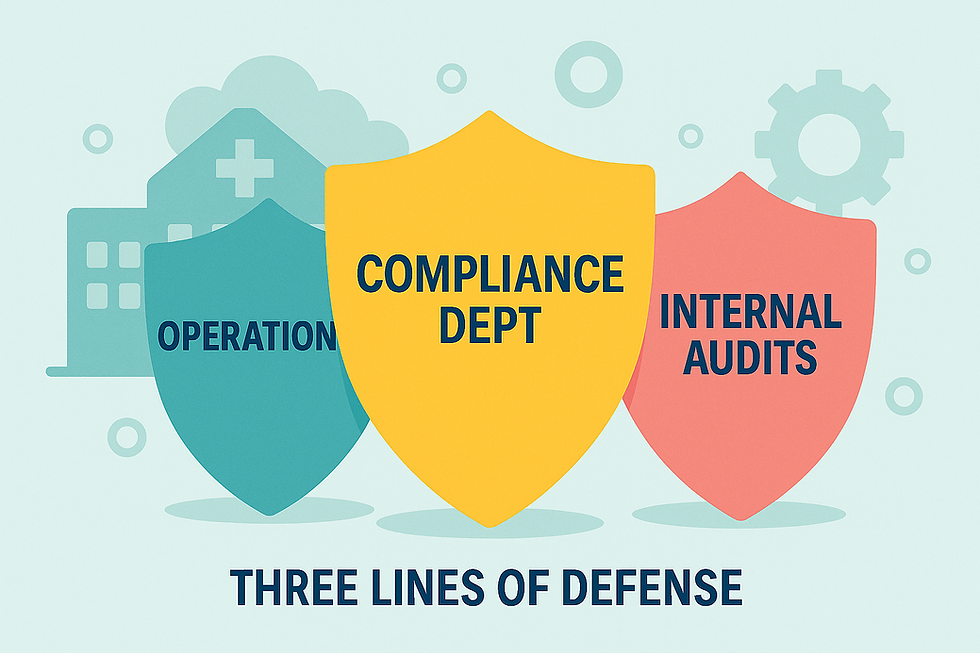Navigating Compliance Under CMS’s CY 2026 MA & Part D Final Rule
- Jessica Zeff

- Jun 22
- 3 min read
In April 2025, CMS finalized its Contract Year 2026 Policy and Technical Changes to Medicare Advantage* (MA, Part C) and Medicare Prescription Drug Benefit (Part D), with implementation starting January 1, 2026. Below, we explore the most significant provisions and offer actionable guidance for compliance professionals.
1. Inpatient Admission
Each year, CMS fine-tunes MA and Part D policies. But this year’s rule packs a punch. Between enhanced Star Rating measures, tightened prior-authorization safeguards, and new cost-sharing mandates, CMS is clarifying what compliance success looks like.
What changed: Plans can no longer retroactively change approved inpatient admissions—unless there was an obvious error or fraud.
Compliance impacts:
Ensures stability and predictability in clinical operations.
Requires rigorous documentation at time of authorization.
Action checklist:
Review and strengthen inpatient approval workflows.
Train staff to document thoroughly and accurately to withstand potential appeal or audit scrutiny.
2. Appeals and Notifications
What changed: The definition of “organization determinations” was expanded to include decisions made during the course of care, not only prior to service, ensuring these are appealable.
Compliance impacts:
MA plans must enhance processes for notifying enrollees of denials or restrictions right when they occur.
Appeals processes must be timely and well-documented.
Action checklist:
Audit notification systems to ensure real-time alerts.
Confirm frontline and back-office teams understand appeal timelines and their duty to document all steps.
3. Vaccines & Insulin Access
What changed: CMS codified the Inflation Reduction Act’s (IRA) provisions requiring zero cost-sharing for adult vaccines and capping insulin copays at $35/month or a calculated 25% of negotiated/max fair price.
Compliance impacts:
Part D plan formularies must reflect these cost-sharing rules.
Claims systems need to apply the correct copay logic and reimburse pharmacies for necessary waivers.
Action checklist:
Review Part D plan benefit designs for full codification alignment.
Validate pharmacy claims pipelines properly calculate copays and routes benefits correctly.
4. Medicare Prescription Payment Plan (MPPP)
What changed: The IRA-inspired Prescription Payment Plan, which lets beneficiaries spread drug costs monthly, was formally codified. It includes required disclosure of plan structure, billing via unique BIN/PCN, and updated appeals/outreach processes.
Compliance impacts:
Sponsors must communicate MPPP options throughout the year.
Systems must process claims using the separate BIN/PCN and avoid related participant fees.
Action checklist:
Update member communications, plan documents, and internal training on MPPP eligibility, BIN/PCN processing, and fee prohibitions.
Establish monitoring for correct BIN/PCN use and appeals timing.
5. Audit & Reporting
What changed: CMS codified new rules for audits and medical loss ratio (MLR) reporting—now encompassing provider incentives, admin cost adjustments, and standardized audit protocols for MA and Part D.
Compliance impacts:
Organizations can expect more intensive MLR scrutiny, including an appeals process.
Adult vaccine & insulin cost-sharing must be tracked and reported.
Action checklist:
Update financial teams on MLR methodology and prepare for audit readiness.
Enhance data systems to capture cost-sharing waivers and incentive allocations for accurate reporting.
Compliance Strategy Snapshot
Goal | Tactics |
Enhance documentation | Train clinicians to document inpatient authorizations comprehensively. |
Strengthen appeals processes | Implement real-time alerts and appeals tracking. |
Align benefits with codified rules | Audit formularies and claims systems for cost-sharing accuracy. |
Educate on MPPP requirements | Revise communications and billing systems; run audits for BIN/PCN usage. |
Prepare for intensified audits | Align MLR reporting and train finance/audit teams on appeals processes. |
Final Thoughts
CMS’s CY 2026 updates formalize important cost-sharing protections, tighten admission reviews, streamline appeals, and elevate audit standards. These changes shift from optional to mandatory—making readiness essential.
Compliance teams should prioritize revising policies, training teams, and validating system configurations now. Proactive preparation will ease implementation, reduce risk, and improve patient satisfaction and regulatory alignment.
Need an audit checklist, webinar for your team, or help integrating these updates? I can help with tools and tailored implementation strategies.
— Jessica




Comments